Rebecca Pyle: Muses & Musings
/Rebecca Pyle is a cousin of some long-ago sort to American president Andrew Jackson, and the daughter and wife of American journalists. She appears as writer or artist or both in Poor Yorick, New England Review, Indian Review, Remembered Arts Journal, Stoneboat, Requited Journal, Map Literary (forthcoming), and Wisconsin Review. Her new chapbook of poetry, The Underwater American Songbook, appears now within art/lit journal Underwater New York. A photograph of artwork by her, done in chalk and cement and pastels on Masonite, is its cover.
She once shared the first prize purse in the National Poetry Competition in the United Kingdom, with Medbhe McGuckian, Irish poet and overall winner. Rebecca Pyle now lives in Utah not far from the Great Salt Lake and its islands heavily populated by birds.
She speaks with Content Editor Sarah Raines below.
I adore your poem “The Beauty of the Fork.” What exactly spurred you to create this poem?
Sometimes, maybe, a dinner that never happened, to a writer, is a poem. This happens in what I call royal time, realer than real time. This poem mixes the beautiful but rigorous disciplines of violin playing and the serious riding of horses; it evokes the horse barn, full of its sudden light when a door opens, opposed to its usual restful dark, comparable perhaps to the hours a violinist practices and practices, and the sudden illumination of performance, and, of course, the long working periods of a writer.
There really is an Il Violino restaurant, very near Lincoln Center. I once walked past it, and thought, oh, wouldn’t that be fine place to go to, with a violinist?
I have the privilege of knowing a very fine violinist well; he is one of my muses, I suppose, a cherished friend, even once one of my boyfriends during university days, very long ago. Every year or so lately I attend one of his concerts in New York, and sometimes we meet afterward and catch up; once, we didn’t, and I wished we’d met.
Melancholy—I imagined this. Just being in a restaurant on land wasn’t enough, or being in a present-tense one with factory-made silverware and glasses. It’s clear I idolize the violinist and still mourn a loss of closeness to him, and I envy still, as I am sure every person ever close to a musician does, their musician’s relationship with their musical instrument, and, with music itself (music the muse-formidable).
This poem could be in my next poetry chapbook which my husband and I agree could be called Imagined Dinners with Men. Female enemies might call it Slut.
When did you first know you wanted to write? What is it about writing that keeps you at it?
I didn’t have much hope of being a writer, or much belief that anyone else in present time was anything, really, but pretender. Fairy tales made me understand they couldn’t be outdone; they hold everything writing should be. Mystery, story, turnabouts, roundabouts, terrible and delicious yearning. All writing, to me, seemed to have been done long ago, and everything after fairy tales was a watered-down imitation of that powerfulness.
But I had a mother who was all things artistic, a fairy tale in herself. A great reader and thinker and natural writer, artist who never bloomed. Aesthetic but not in the way of the dogged and overly-university-trained, who can study the most esoteric subjects and study and study for years, and have all the grace and intuitiveness of a dead-eyed department-store manager. She had an innate eye for visual beauty, and an ear for language and ideas that went far beyond the ordinary. A great beauty as well. She had it all, but she also had four children, beginning when she was twenty; but she didn’t let that curb her ferocity about seeing through most of imitative thought around her. I still clearly remember her saying, when I was a teenager, that it was too bad a couple with young children were moving into a house nearby. Why, I asked. Because parents with young children are always dull, she said. I got the message. We’d hampered her creative life, though we too were something she’d created. Real things—could be a burden.
Writing may be a bit like pottery. My mother needed her own pottery shed, a place that was just for painting or writing or saying aloud lines for a play. She never had that, or the wonderful grace that is a computer, a safekeeping cupboard, a pie-safe for what you’ve written.
But I never forget that I had a parent who in a quick irritable second knew just what to do to make anything—make sense, an argument won. My mother if she was here would probably quickly agree with me—that most lawyers become lawyers—because it’s the only way they can finally truthfully claim they’ve ever won an argument.
She knew how to speak a sentence so you would have trouble forgetting it, at least for a while. Knew what was funny and what wasn’t, most of the time. She was not a practical person; she was all ether in the distance. But also full of almost architectural savvy. Lovely. Rare.
I have many other memories of relatives who were similarly—I want to say magic, but that word’s overworked since Harry Potterville. Uncles. A grandfather. An aunt or two.
What advice do you have for writers who are beginning to send work out for publication?
It eases the writer’s loneliness, and self-doubt—being published. Someone, at least, is not embarrassed by you. It gives you the real and unreal feeling of being a surveyor; you’ve described the lay of the land, even if imaginary land, and you own it in a special way, much the way a painter owns a place she or he has painted. I suppose I may own Il Violino now near Lincoln Center. I’ll be disappointed if I’m ever taken to dinner there, and the owners don’t know me, or I suddenly realize it’s not a boat I’m on, in the distance, no flood waters are rushing by.
What it is it about creating visual art that captivates your attention?
The putting things in new order, the feeling of making something almost like a hanging tapestry made of both your memories and your wish-revisions. It’s always a map of sorts, and a sort of authority. Over something. As if you’re clearing confusions in your brain.
Or, even, setting up new ones. Escher-endless.
Recently someone read in our writing group about what Prometheus’s first discovery was—not fire, but salt. And read it so convincingly someone had to ask him, was it always salt, and we got it wrong, believing that about fire being his first discovery? The writer said no, but while writing he had to reinvent Prometheus and his discoveries, to keep from being the simple idiotic repeater of a myth or a legend. In his writer’s euphoria, re-owning it, taking that risk. Painting is very similar to that, the feeling that you are not just recording, but designing, insisting how things really are or should be; letting your brain be the patternmaker, not the follower too much of anyone else’s.
In expressionistic painting you may reform anything or everything; you have recognizable parameters, but you paint the color you feel, the shape you feel necessary. It’s different than simple reality. The camera freed us from many things.
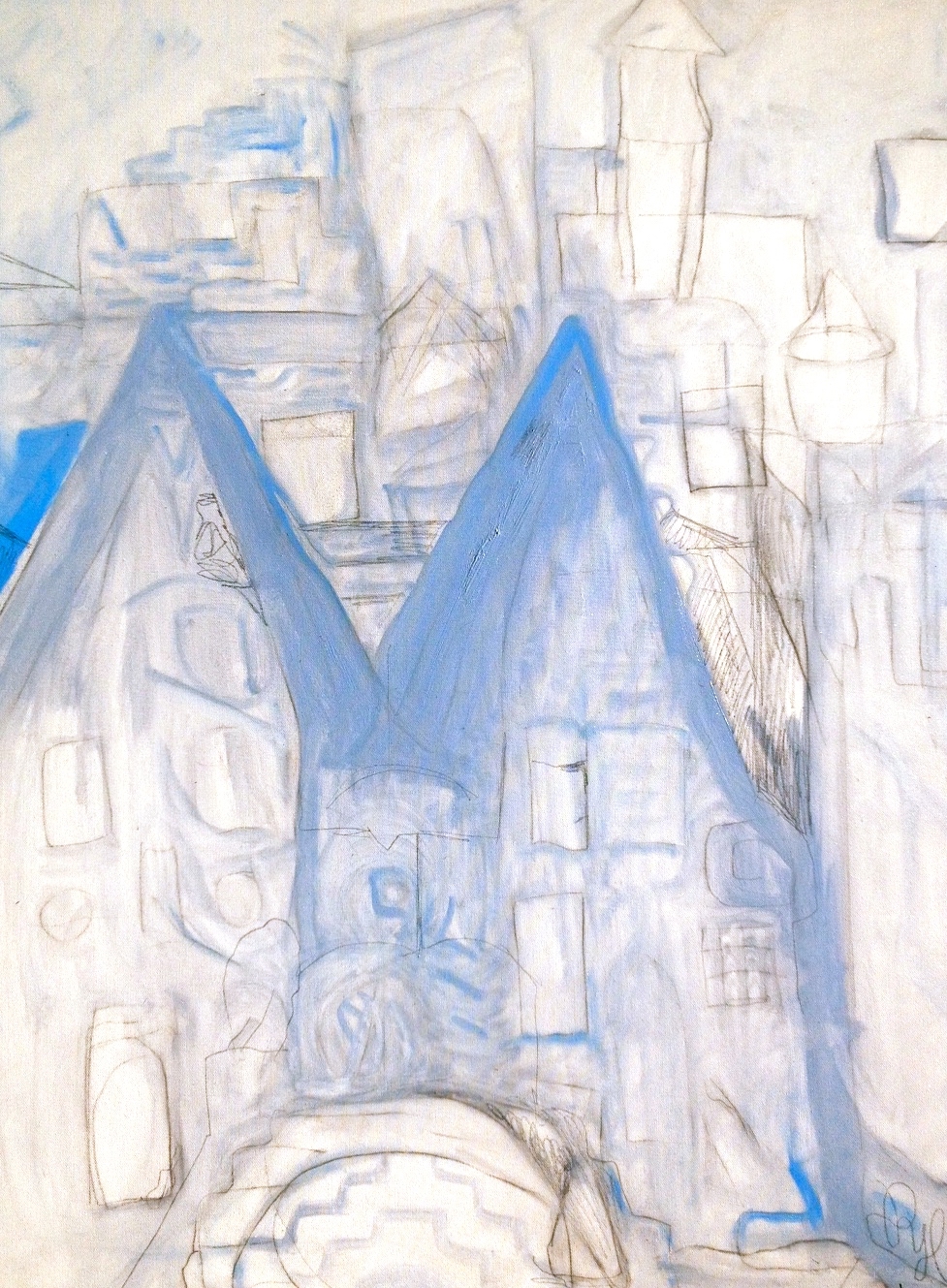
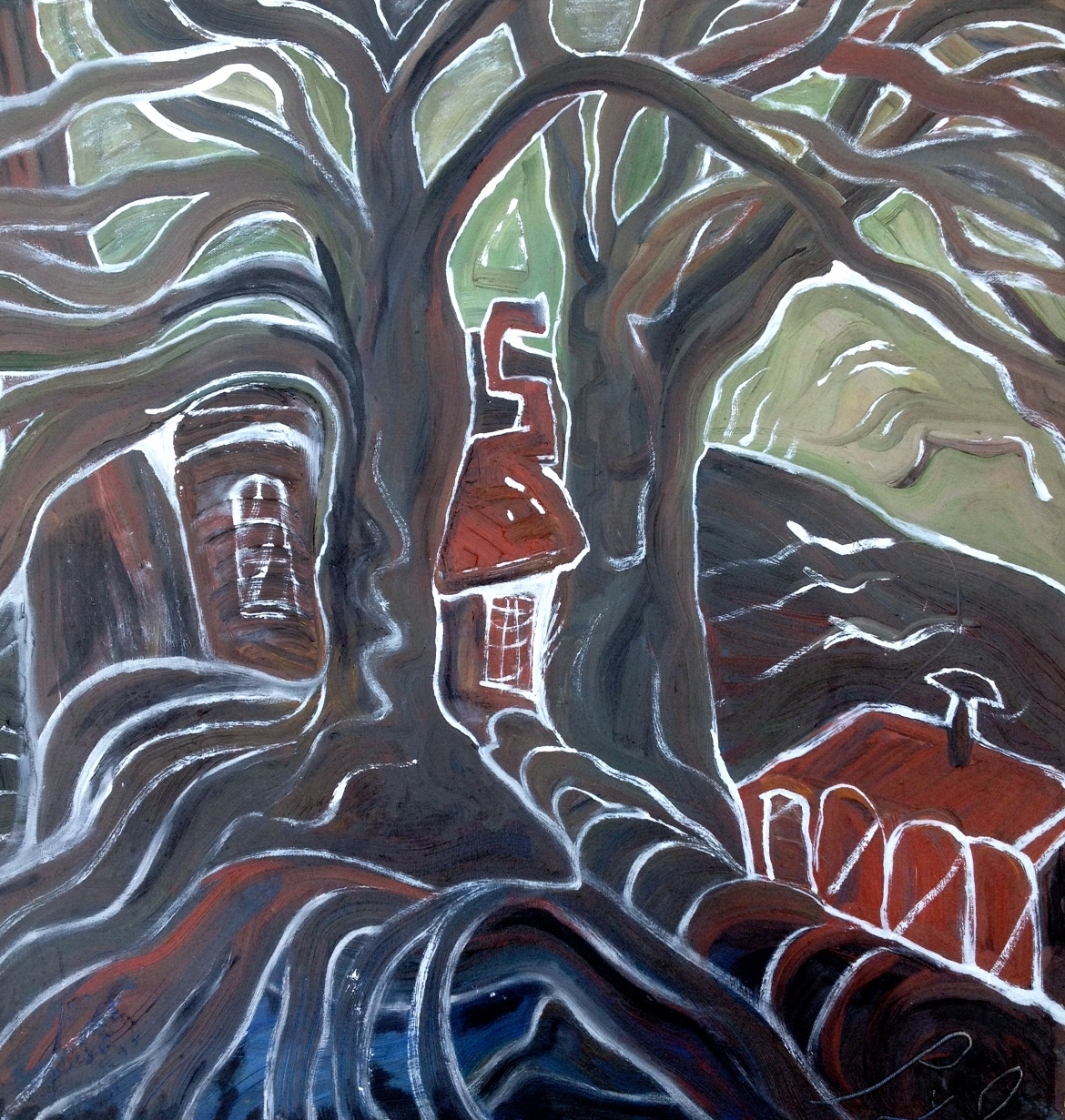
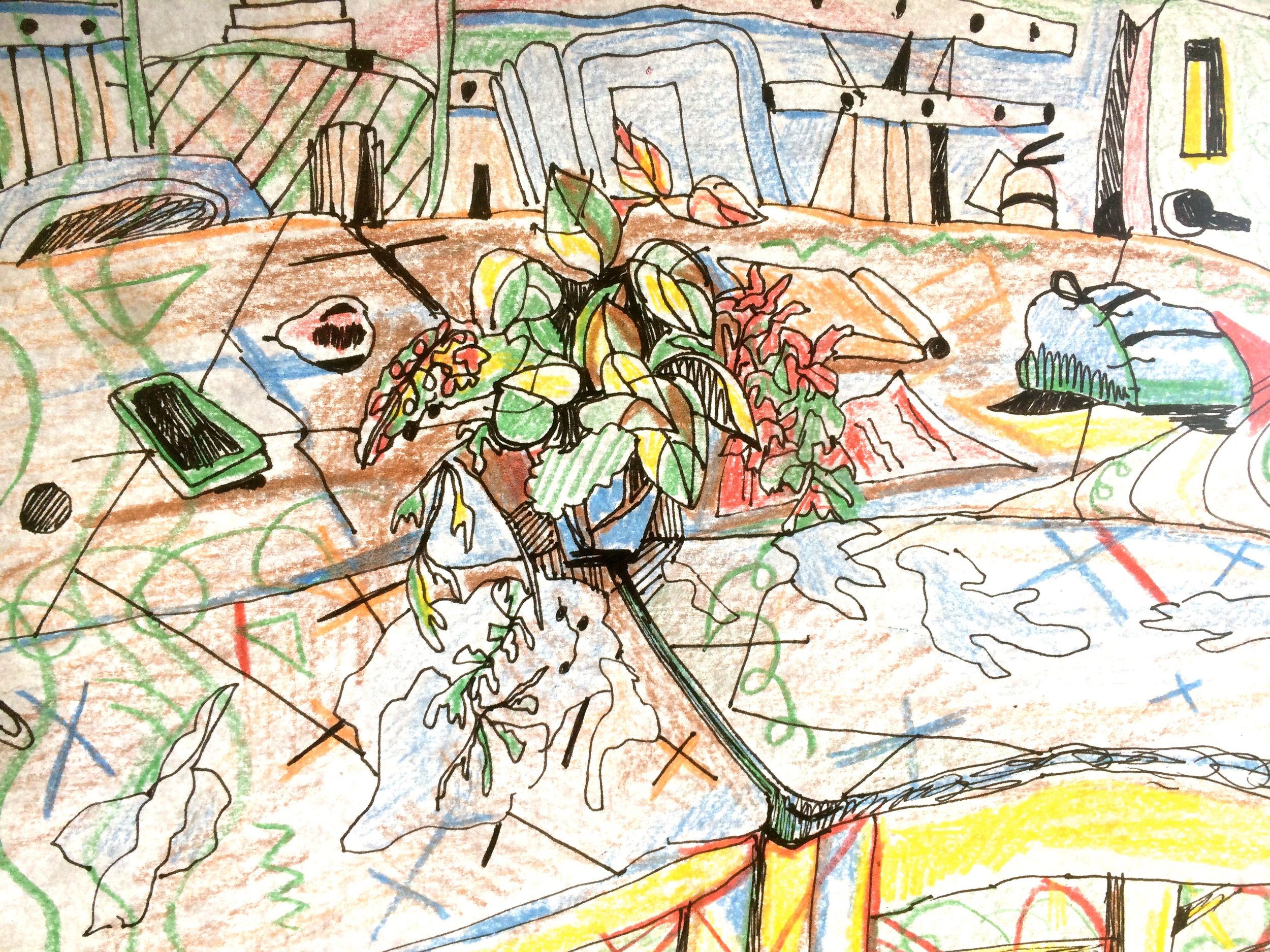
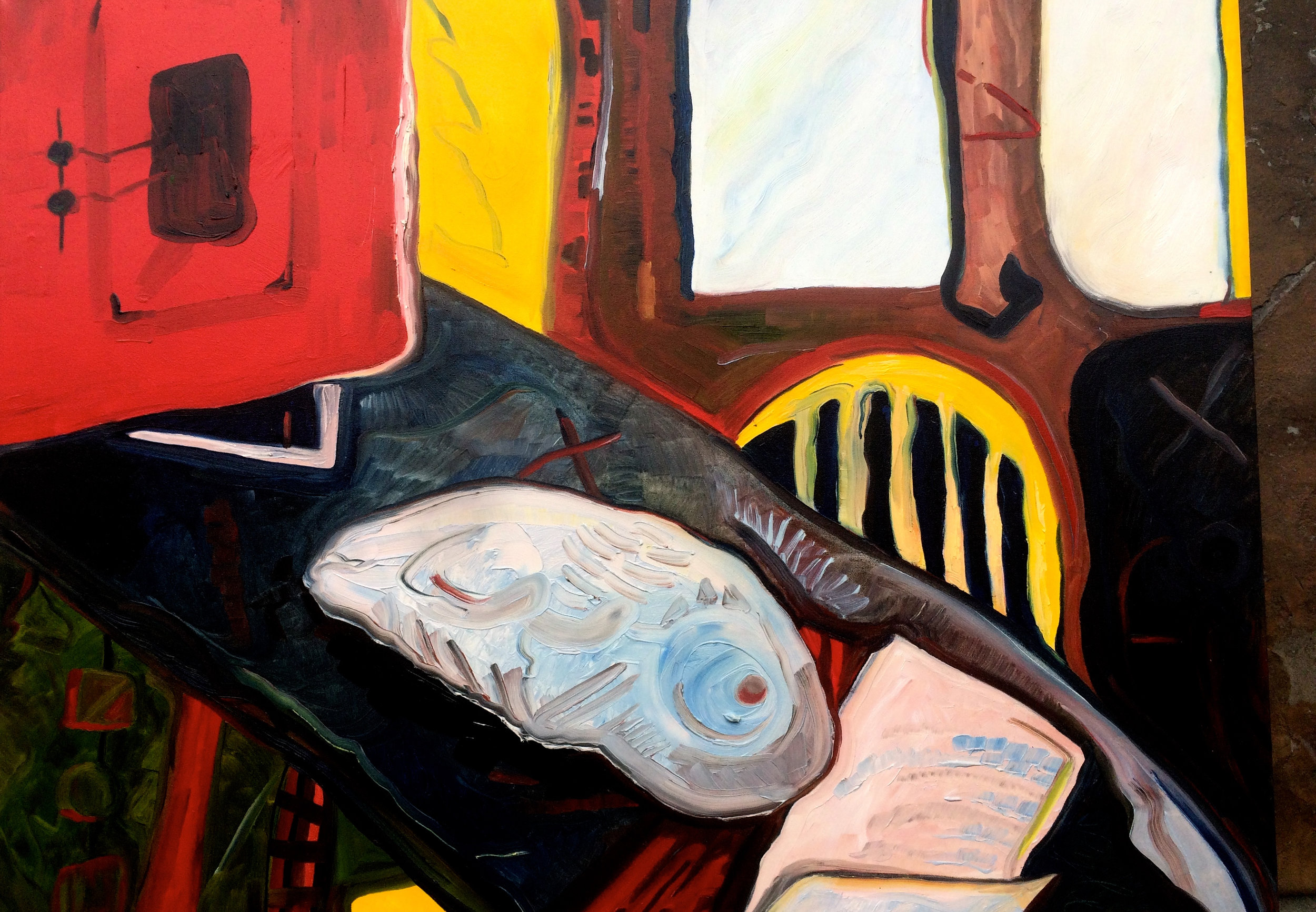
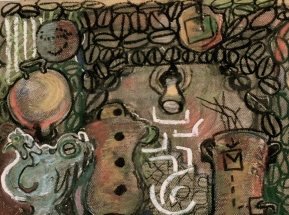
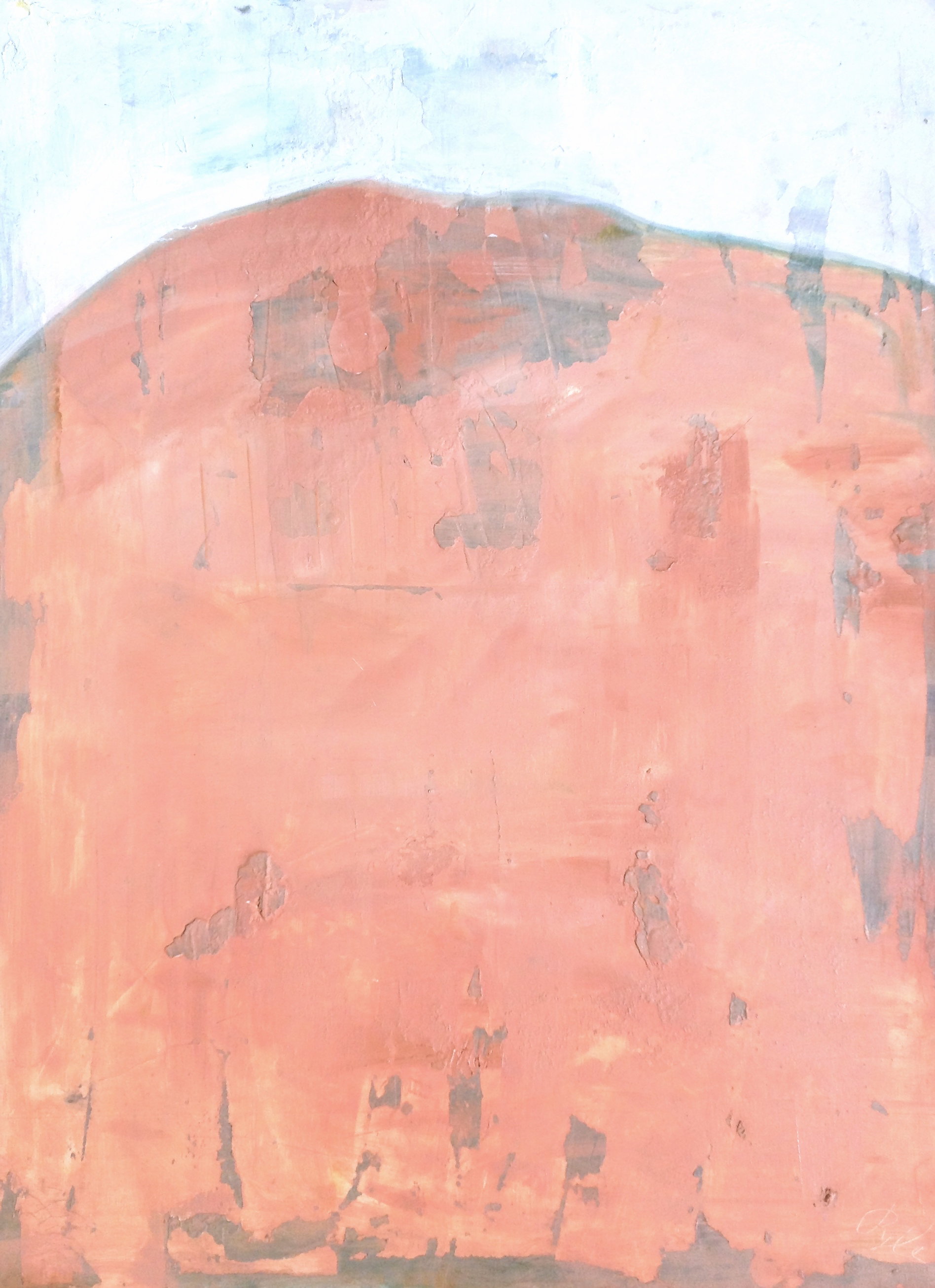
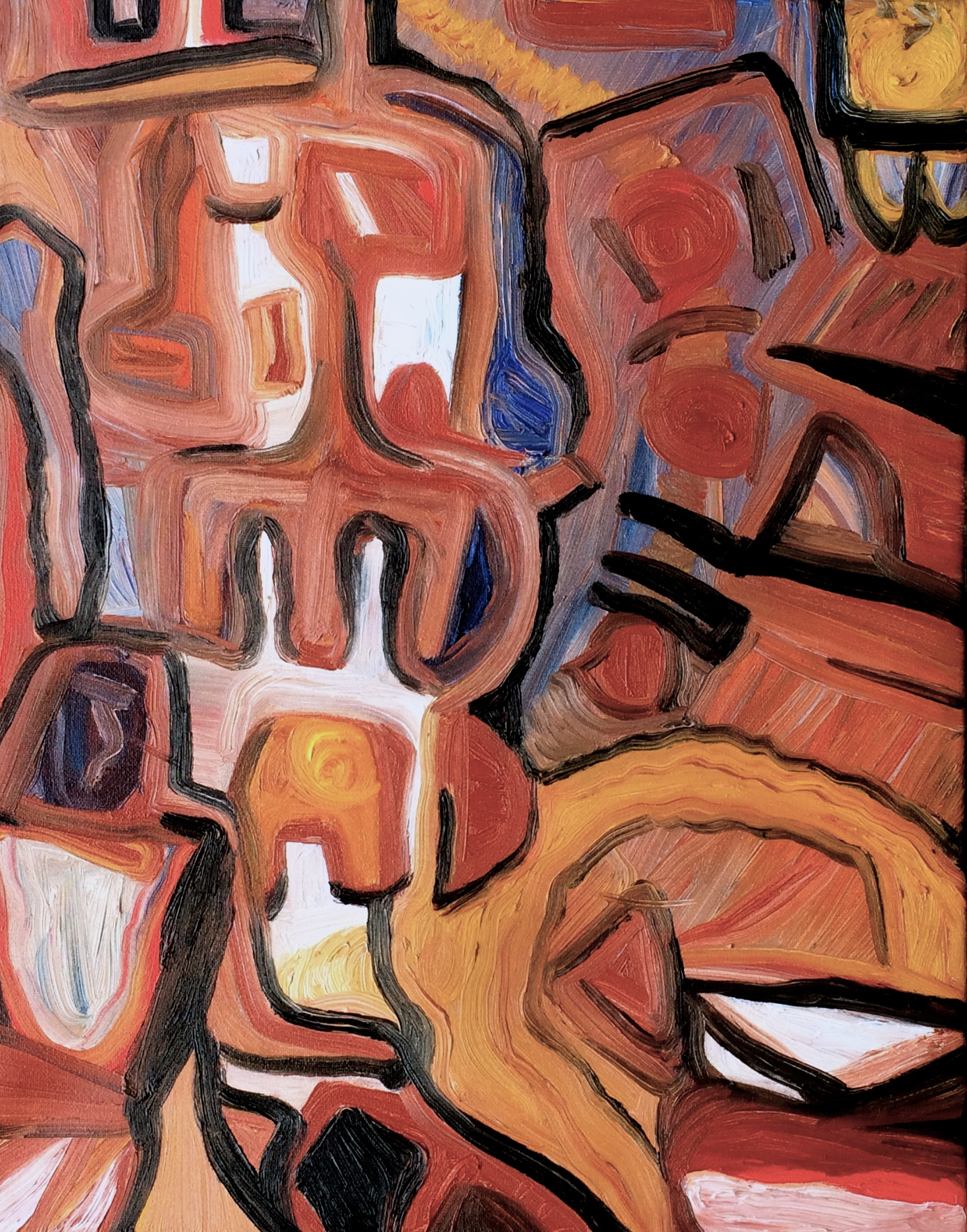
Paintings by Rebecca Pyle. See more here.
How do you make time for both visual arts and writing?
I’m fortunate—I have the luxury of time. And listening. In Salt Lake City I live surrounded by mountains. They listen, somehow.
You currently reside in Utah but have lived in Alaska, Kansas, New York City, and London. How do you think the various landscapes and social atmospheres have influenced your writing and art?
I’ve lived in many more places, but I think these four have a good shock of contrast, so I mention these four sometimes as a construct for surprise. I’m in each of these four places a part of each day, at least for a few seconds; I’m a great storer of memory. The visual perception of, say, a table under a window, is very different in each of these places. And the voices of people are very different. And even of course the run and the rhythm of the speech, the thinking, the yearnings, the energies, the expressions.
We are all ruled by place; I don’t think there’s any way around that—that recognition we’d have a completely different life, and spirit, depending on where we live, depending on where we grew. As some say: it’s not what you’ve read, it’s where you’ve been. But, of course, it’s what you’ve read, too. And what you write, if you’re a writer.
Do you have particular muses that you keep coming back to?
I prefer to think they keep finding me. But that’s the way you have to feel about a muse, that they need you too, but—the truth is they’re above, you’re below, you must find them, either in person, or as you remember them in the secret, memory-storage corridors of your brain.
These are certain people even from early childhood who clearly, or murkily—eventually somehow expressed to you they had vision fairly independent of others. Often they have all the thoughts and fine-tune of the artist or the writer, but not the inclination, or time. You became sure of their imaginative and understanding powers; your awareness grew over time. It was even in their gaze. They were seeing far ahead, or far away, or far back in time; the present was largely an inconvenience, the dog-paddle of life. Not much beauty in it, in their eyes. (The present.)
That’s the mark of the (human) muse, their particular, emotional but cool, distant-vision; and sometimes they’re standing in front of you, looking at what you’re looking at, and you can feel their reaction to what they see. They lead you, almost like the person leading a horse by rope and halter; I think some people might call it—telepathic. Others might call it what all true friends share.
For me, writing and art are about creating an expression of self that couldn't come from anyone else. What do they mean to you?
We are chimps. Our nature is monkey see monkey do, and a lot of writing and artwork and music and weddings and academics and menus and novels are repeatings. We’re doomed to it, and I think sometimes the goal of writers is to find out how they are like others; when they are feeling too different or isolated. In the act of creation they un-numb themselves. But now and then we have an idea like Daedalus and his son Icarus; we’re going to fly in a way no one’s flown before. With wax and feathers and a measure of braveness or desperation we can become birds and mostly, or almost, cross an ocean no one’s crossed before—this new way.
Or, like the lost Roanoke tribe (I need to let you know The Lost Colony of Roanoke was my junior research theme/subject in high school; I drew all my info from exactly two books at the library, and a few magazine articles---it’s wonderful to research without too many things to consult). You like the colonists keep thinking they, we, are going to survive somehow; they are going to be found; they are not going to die in vain.
Perhaps a great deal of writing is about—rescue.
I see that Roanoke, where you are, is where the Roanoke river begins; and where the Roanoke river ends is where the oceanic island Roanoke is, where the lost colonists once were. Nobody knows what happened to them, though there was a lot of excitement several years ago about a gold ring. Then it was discovered the ring, with its lion design, was not even gold. It was brass, though being brass doesn’t mean it couldn’t have been worn by someone in that large group of colonists. It will be figured out. (The Roanoke island colonists the ones who carved the word CROATAN in a tree’s bark—to possibly direct us to them, to where they were going. But were never, ever, found.)
I wouldn’t mind traveling down the Roanoke river, landing at that island. I wonder what that’s like, and I wonder how soon the mystery of where they went, how they perished, will ever come to life and light, be solved.
As writer we are leaving clues. Sometimes, it is only clues to beauty.
Thanks for bringing me to this river. I hope I’ve been, here and there, interesting or at least different from most. Thanks for publishing my poem, with its odd title, and also, some of my oil paintings, alongside, or above, or below—my babbling river of answers.
You can read Rebecca’s poem “The Beauty of the Fork” here.

